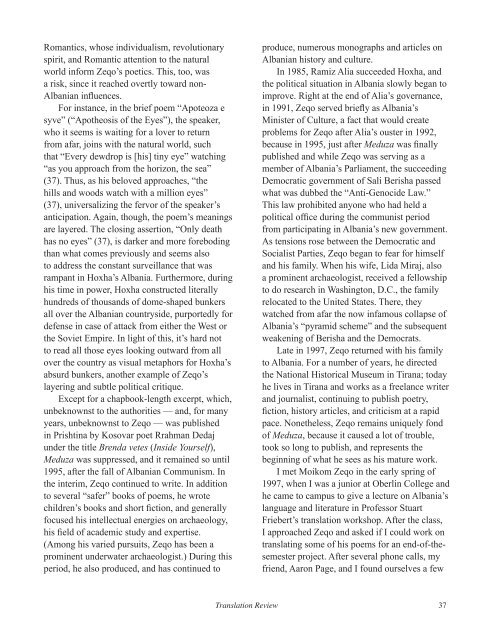Table of contents - The University of Texas at Dallas
Table of contents - The University of Texas at Dallas
Table of contents - The University of Texas at Dallas
Create successful ePaper yourself
Turn your PDF publications into a flip-book with our unique Google optimized e-Paper software.
Romantics, whose individualism, revolutionary<br />
spirit, and Romantic <strong>at</strong>tention to the n<strong>at</strong>ural<br />
world inform Zeqo’s poetics. This, too, was<br />
a risk, since it reached overtly toward non-<br />
Albanian influences.<br />
For instance, in the brief poem “Apoteoza e<br />
syve” (“Apotheosis <strong>of</strong> the Eyes”), the speaker,<br />
who it seems is waiting for a lover to return<br />
from afar, joins with the n<strong>at</strong>ural world, such<br />
th<strong>at</strong> “Every dewdrop is [his] tiny eye” w<strong>at</strong>ching<br />
“as you approach from the horizon, the sea”<br />
(37). Thus, as his beloved approaches, “the<br />
hills and woods w<strong>at</strong>ch with a million eyes”<br />
(37), universalizing the fervor <strong>of</strong> the speaker’s<br />
anticip<strong>at</strong>ion. Again, though, the poem’s meanings<br />
are layered. <strong>The</strong> closing assertion, “Only de<strong>at</strong>h<br />
has no eyes” (37), is darker and more foreboding<br />
than wh<strong>at</strong> comes previously and seems also<br />
to address the constant surveillance th<strong>at</strong> was<br />
rampant in Hoxha’s Albania. Furthermore, during<br />
his time in power, Hoxha constructed literally<br />
hundreds <strong>of</strong> thousands <strong>of</strong> dome-shaped bunkers<br />
all over the Albanian countryside, purportedly for<br />
defense in case <strong>of</strong> <strong>at</strong>tack from either the West or<br />
the Soviet Empire. In light <strong>of</strong> this, it’s hard not<br />
to read all those eyes looking outward from all<br />
over the country as visual metaphors for Hoxha’s<br />
absurd bunkers, another example <strong>of</strong> Zeqo’s<br />
layering and subtle political critique.<br />
Except for a chapbook-length excerpt, which,<br />
unbeknownst to the authorities — and, for many<br />
years, unbeknownst to Zeqo — was published<br />
in Prishtina by Kosovar poet Rrahman Dedaj<br />
under the title Brenda vetes (Inside Yourself),<br />
Meduza was suppressed, and it remained so until<br />
1995, after the fall <strong>of</strong> Albanian Communism. In<br />
the interim, Zeqo continued to write. In addition<br />
to several “safer” books <strong>of</strong> poems, he wrote<br />
children’s books and short fiction, and generally<br />
focused his intellectual energies on archaeology,<br />
his field <strong>of</strong> academic study and expertise.<br />
(Among his varied pursuits, Zeqo has been a<br />
prominent underw<strong>at</strong>er archaeologist.) During this<br />
period, he also produced, and has continued to<br />
produce, numerous monographs and articles on<br />
Albanian history and culture.<br />
In 1985, Ramiz Alia succeeded Hoxha, and<br />
the political situ<strong>at</strong>ion in Albania slowly began to<br />
improve. Right <strong>at</strong> the end <strong>of</strong> Alia’s governance,<br />
in 1991, Zeqo served briefly as Albania’s<br />
Minister <strong>of</strong> Culture, a fact th<strong>at</strong> would cre<strong>at</strong>e<br />
problems for Zeqo after Alia’s ouster in 1992,<br />
because in 1995, just after Meduza was finally<br />
published and while Zeqo was serving as a<br />
member <strong>of</strong> Albania’s Parliament, the succeeding<br />
Democr<strong>at</strong>ic government <strong>of</strong> Sali Berisha passed<br />
wh<strong>at</strong> was dubbed the “Anti-Genocide Law.”<br />
This law prohibited anyone who had held a<br />
political <strong>of</strong>fice during the communist period<br />
from particip<strong>at</strong>ing in Albania’s new government.<br />
As tensions rose between the Democr<strong>at</strong>ic and<br />
Socialist Parties, Zeqo began to fear for himself<br />
and his family. When his wife, Lida Miraj, also<br />
a prominent archaeologist, received a fellowship<br />
to do research in Washington, D.C., the family<br />
reloc<strong>at</strong>ed to the United St<strong>at</strong>es. <strong>The</strong>re, they<br />
w<strong>at</strong>ched from afar the now infamous collapse <strong>of</strong><br />
Albania’s “pyramid scheme” and the subsequent<br />
weakening <strong>of</strong> Berisha and the Democr<strong>at</strong>s.<br />
L<strong>at</strong>e in 1997, Zeqo returned with his family<br />
to Albania. For a number <strong>of</strong> years, he directed<br />
the N<strong>at</strong>ional Historical Museum in Tirana; today<br />
he lives in Tirana and works as a freelance writer<br />
and journalist, continuing to publish poetry,<br />
fiction, history articles, and criticism <strong>at</strong> a rapid<br />
pace. Nonetheless, Zeqo remains uniquely fond<br />
<strong>of</strong> Meduza, because it caused a lot <strong>of</strong> trouble,<br />
took so long to publish, and represents the<br />
beginning <strong>of</strong> wh<strong>at</strong> he sees as his m<strong>at</strong>ure work.<br />
I met Moikom Zeqo in the early spring <strong>of</strong><br />
1997, when I was a junior <strong>at</strong> Oberlin College and<br />
he came to campus to give a lecture on Albania’s<br />
language and liter<strong>at</strong>ure in Pr<strong>of</strong>essor Stuart<br />
Friebert’s transl<strong>at</strong>ion workshop. After the class,<br />
I approached Zeqo and asked if I could work on<br />
transl<strong>at</strong>ing some <strong>of</strong> his poems for an end-<strong>of</strong>-thesemester<br />
project. After several phone calls, my<br />
friend, Aaron Page, and I found ourselves a few<br />
Transl<strong>at</strong>ion Review 37

















